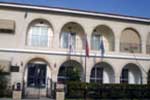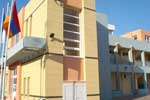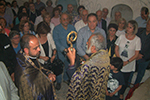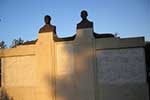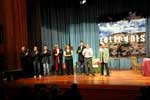Sassounian Column

TURKEY’S FOREIGN MINISTER IN SEARCH OF ‘SOFT’ ARMENIANS
Foreign Minister Ahmet Davutoglu, Turkey’s ‘man on the run,’ has added to his extremely busy schedule the new task of travelling around the globe trying to recruit ‘sensible’ Armenians.
Davutoglu has embarked on such a desperate initiative after the failure of all Turkish attempts to divide and conquer the Armenians and weaken their resolve to pursue their just cause. The Turkish Foreign Minister openly acknowledged that his urgent efforts are prompted by the looming 100th anniversary of the Armenian Genocide that hangs like a Damoclean Sword over his country.
After the collapse of the Turkish Armenian Reconciliation Commission (TARC) and Turkey’s futile attempts to seek ‘friendly’ Armenians around the world, Ankara gave up on the Diaspora altogether and turned its attention to a ‘softer target’ -- the Government of Armenia.
Initially, Turkey registered some success when the Armenia-Turkey Protocols were signed by both countries, under the guise of opening their mutual border. However, this latest attempt to drive a wedge between ‘soft’ Armenian officials and ‘hard-line’ Diasporans also failed, when the much-touted Protocols were not ratified.
Realizing that Turkey had to deal with the Diaspora, not just Armenia to resolve genocide related issues, Davutoglu once again turned his attention to Armenian communities worldwide. During a March 24, 2010 CNN-Turk interview, he announced that Turkish authorities would initiate a dialog with ‘sensible’ Diaspora Armenians.
To pursue this stratagem, in April 2010 Davutoglu met in Washington with Turkey’s ambassadors to the United States and Canada, and Consul Generals in Chicago, Houston, Los Angeles, and Toronto. He instructed them to contact Armenians who are open to dialog, and to avoid ‘hard-line groups,’ according to the Turkish ‘Today’s Zaman’ newspaper.
A few weeks later, ‘Hurriyet’ reported that the Foreign Ministry issued a 10-point action plan, instructing Turkish diplomats worldwide to:
- Invite and involve local Armenians in Turkish events;
- Participate in Armenian community activities;
- Contact Armenians who are materially benefiting from making genocide claims as well as recent immigrants from Turkey; and invite to Turkey those who harbor anti-Turkish sentiments;
- Establish good relations with Armenian diplomats and attend their official events;
- Accept speaking opportunities at local community and university events to explain Turkey’s position on Armenian genocide claims;
- Establish contacts with local academics to explain to them Turkey’s position;
- Develop contacts with diplomats of countries neighboring Turkey and familiarize them with Turkey’s position on Armenian genocide claims;
- Advocate the creation of ‘a joint commission of historians’;
- Promote normalization of Armenian-Turkish relations;
- Emphasize that the peaceful resolution of the Karabagh conflict would benefit Armenian-Turkish relations.
In December 2011, Turkey announced a revised concept of ‘Diaspora’ to include all descendants of ‘Anatolia,’ regardless of their religion or sect. Davutoglu instructed all Turkish diplomats to hold ‘face-to-face’ meetings with such individuals in order to discuss their ‘joint history’ and "the suffering of all Ottoman people during the incidents of the World War I era."
Dissatisfied with the efforts of his diplomats, Davutoglu decided to take matters into his own hands. Last month, he spent several hours in Washington meeting privately with several Armenians and non-Armenians from the Los Angeles area to discuss ‘Armenian-Turkish reconciliation.’ The Turkish Foreign Minister also invited the attendees to come to Ankara and bring along other ‘prominent’ Armenians. Since then, Davutoglu has held similar meetings elsewhere.
Meanwhile, another Turkish-initiated group on ‘Armenian-Turkish reconciliation’ will be launched on April 12 in Washington. The host group ‘HasNa’ is set to meet at the offices of Arnold & Porter, a lobbying firm hired by the Turkish government. The attendees will include some Armenians and Turks, U.S. government officials, members of the media, non-governmental organizations, academics, and others.
Armenians who choose to get involved in Turkish recruitment schemes could well be seeking fame or fortune, or are well-intentioned, but naive do-gooders. However, regardless of the reasons for their involvement in such questionable practices, they should be mindful of the consequences of their actions:
- Dialog for the sake of dialog could do more damage than good to the Armenian Cause. The Turkish government would exploit such efforts to create the false impression that Armenians and Turks are in the process of reconciling, thereby derailing the recognition of the Armenian Genocide by other countries.
- Unless a specific positive outcome is agreed upon in advance, there is a good chance that the Armenian participants would end up holding an empty bag.
- Only Armenian officials and credible leaders with diplomatic expertise should be negotiating with shrewd and skilled Turkish diplomats. Otherwise, Turkish officials will cleverly cut a deal with those who are bound to be less demanding and more accommodating.






